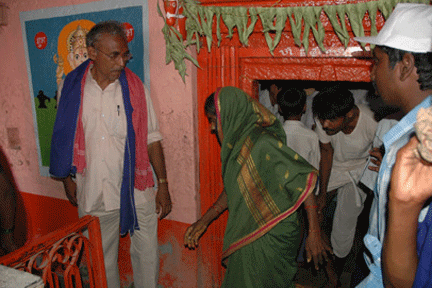 People's Democracy
People's Democracy
(Weekly
Organ of the Communist Party of India (Marxist)
No. 16
April 16, 2006
(Weekly
Organ of the Communist Party of India (Marxist)
|
Vol.
XXX
No. 16 April 16, 2006 |

FLAGGED OFF: Veteran civil liberties activist K G Kannabiran flags off the cycle yatra in Vikarabad on April 2
THE
13-day cycle yatra embarked under the banner of Kulavivaksha Vyatireka Porata
Sangham (KVPS) – Struggle Committee against Caste Discrimination – led by
its vice president and state secretary of the CPI(M), B V Raghavulu, to raise
social consciousness of the dalits against caste discrimination and oppression
and for equality and their rights is going on successfully and receiving
tremendous response in Ranga Reddy district, giving a new hope and spirit to the
dalits to unite themselves to fight for their rights.
Started
on April 2, 2006, at Vikarabad in Ranga Reddy district, this yatra for social
consciousness would cover about 205 villages and reach Hyderabad on April 13 and
a mass rally would be taken out on April 14 from Mehedipatnam to the Ambedkar
statue at Tankbund where a public meeting would be held, coinciding with the
birth anniversary of Dr B R Ambedkar.
NEED
FOR SOCIAL
REVOLUTION
Formed
nine years back in the state and organising struggles against untouchability and
caste discrimination and on other problems of the dalits, KVPS conducted a
state-wide survey on the conditions of the dalits. In the survey it was
found that in Ranga Reddy district, surrounding the state capital, the
dalits were being subjected to discrimination in several forms –
untouchability, two glasses system, no entry into temples, barbers not
being allowed to do hair cutting, keeping dalits away from drinking water taps
and bores, lack of civic amenities in dalit colonies, etc. “There is no
scope for ending discrimination simply based on law and the government alone.
Unless the society, progressive forces and parties relentlessly fight for a long
time, we cannot eradicate discrimination. KVPS was formed only for this
and it is trying to end this kind of discrimination. As a part and parcel
of this effort, this cycle yatra for social consciousness is taken up”,
explains Raghavulu. As a result of the pressure brought on it by the
movement of KVPS, the earlier TDP government had appointed Justice
Punnayya Commission on scheduled castes and scheduled tribes, but powers and
staff were not given to it. The Commission remained like an organisation without
teeth. It was useful for study and understanding of the problems of the
dalits. Since there was caste discrimination in many forms and the
influence of superstitions was also high in Ranga Reddy district, the yatra for
social consciousness would be useful to raise the consciousness of the dalits
and to bring it to the notice of the government, said Raghavulu.
Led
by Raghavulu, KVPS state general secretary John Wesley, CITU state secretary
Paladugu Bhaskar, SFI state vice president Bhaskar, DYFI state assistant
secretary Venkanna, state secretary of A P Agricultural Workers’ Union N
Venkataswamy, SFI district president and secretary Sobhan and
Narayana, KVPS district secretary Mallesh and district secretary of A P Rythu
Sangham Amreswar are participating in the cycle yatra, braving the excruciating
summer heat. President of People’s Union for Civil Liberties K G Kannabiran
flagged off the cycle yatra, after Raghavulu garlanded the statue of Dr Ambedkar
at Vikarabad. Speaking on the occasion, Raghavulu reminded that the then Telugu
Desam government refused to conduct janmabhoomi programme on the rights of the dalits, and again asked
the present Congress government, which has taken up pallebata, nagarabata and rythubata
programmes, to organise dalit
chaitanya bata to enlighten the dalits about their rights. He made it
clear that if land is distributed to dalits, they can progress with
self-respect. Raghavulu reiterated the demand that the government
must first develop the dalitwadas under the Indiramma scheme started by it from
April 1. He demanded the government to allot 17 per cent of budgetary funds for
the development and welfare of the dalits in the state and appoint an educated
and efficient person as chairman of the Commission on SCs and STs.
Kannabiran termed the cycle yatra the beginning of a social revolution. John
Wesley, state secretary of AIDWA Swaruparani, vice president of KVPS G Ramulu
and others spoke on this occasion.
TUMULTOUS
RESPONSE
Everywhere during the cycle yatra for social consciousness, the local Dalits and other people welcomed it with enthusiasm and tumultuously, submitted memoranda to Raghavulu explaining their numerous problems and heard him and other leaders who addressed them. During the yatra, Raghavulu and other leaders entered the colonies of dalits, examined the conditions there, enquired about the problems they have been facing and took gruel and food along with them. Raghavulu and other leaders asked the dalits to unite and fight for their rights, bring instances of discrimination to their notice and assured them of all support of the KVPS. Raghavulu promised to bring their problems to the notice of the government. If the government won’t respond to solve their problems, the struggle would be intensified, he announced. At several villages instances of grabbing of lands, including burial grounds, of the dalits were brought to the notice of Raghavulu, who in turn installed flags of KVPS in those lands and even ploughed some of them as a token measure. He warned the officers concerned that serious consequences would follow if the lands are not restored to the dalits concerned and action taken against the grabbers.

FORCIBLE TEMPLE ENTRY: Raghavulu leading the dalits entry into a temple after breaking open the locks
At
several villages where dalits were not being allowed by the local landlords and
other upper caste people to enter into temples, Raghavulu and other leaders
dispelled the fears of the dalits and led them into temples playing tappetlu
(drums) and in one case even breaking the locks of a temple at Ekmayi
where the priest was deliberately sent to a neighbouring village and the
other concerned people refused to give the key. These actions gave the dalits a
sense of self-confidence and enthusiasm. Speaking at Mittakodur village,
Raghavulu said when dalits entered the temple at Tirumalapur earlier, the
upper caste people were not allowing water from the local tank to
flow into the lands of the dalits. When dalits are asserting their rights,
they are being subjected to social and economic boycott and atrocities. The
government is not coming to their rescue.
In
some of the villages where a system of two glasses was prevalent in hotels –
not allowing dalits inside or serving them tea, water etc. in separate glasses
– the owners were warned of dire consequences legally and otherwise if
they would not stop this discrimination against dalits. As a token protest
against this discriminatory system, glasses were broken in many such
hotels. Knowing about the cycle yatra, some of the owners of the hotels
introduced disposable glasses. Instances of the local upper caste people not
allowing the barbers to do hair cutting to dalits came to the notice of the
leaders during the yatra. At Rannam village in Yalala mandal, when dalits
were taken to the street where barbers reside, the latter already left, locking
their houses. Barbers from another colony were brought there and Raghavulu
personally supervised hair cutting to one dalit by a barber. When
barbers told him that there would be pressure from people of other castes if
they do hair cutting to dalits, he asked them to bring to his notice if any such
difficulties arise. Raghavulu visited several residential schools and
hostels for scheduled caste children and interacted with the students. He
found that the conditions at these hostels were worse than those in a
central jail, with no drinking facility and toilets.
UTTER
STATE OF NEGLECT
Dalits
in several villages brought to the notice of the yatra team the lack of civic
amenities in their colonies and the kind of discrimination they were being
subjected to. Tribals at Rampur thanda in Tharur mandal pointed out that though
their families have been raising crops for the last eighty years in their lands,
the government has not given them pattas so far. Despite repeated representations, there has been no
response from the district administration, they said. Addressing the
dalits at Navalga village in Basheerabad Mandal, Raghavulu said 16 per cent of
the panchayat funds were not being spent for the development of dalitwadas
(residential areas of dalits), and as the funds were common, dalitwadas were not
being developed. For the development of dalitwadas a separate organisation
should be set up and funds allocated, he said. Without even basic civic
amenities like drinking water, sewerage lines and proper roads, and
education and health facilities, the dalits were leading miserable a life away
from civilisation, said Raghavulu.
John
Wesley said till April 9, the yatra covered 400 km through 91 villages.
During the yatra, in 85 villages entry of dalits into temples was
ensured. In 35 villages, two-glasses system in hotels was broken. He
demanded the government to waive the dues of domestic power bills of SCs and STs.
Wesley found fault with the government for not implementing 18 GOs issued by
itself on the recommendations of Justice Punnayya Commission for the development
and protection of dalits. The officers concerned entrusted with the
responsibility of enlightening the dalits were not visiting the villages and
they were not to be seen anywhere during the yatra also, he criticised.
Eminent
educationist Chukka Ramayya complimented Raghavulu for leading the yatra and
himself participated in it for some time. Nomula Narsimhaiah, leader of the
CPI(M) legislature party, B Tulasidas, president of A P Rythu Sangham, S
Vinaya Kumar, editor of Prajasakti daily,
and T Ashok, editor of Vartha daily,
were among those who participated in the cycle yatra.
The
cycle yatra for social consciousness has once again brought to the fore the
issues of caste discrimination and untouchability. Apart from drawing the
attention of the people in general, the yatra is getting good coverage in
the media, with news and views being expressed widely on the issue. Apart
from alerting the officers in the government, the yatra and related
issues have become a point of hot debate among political leaders, dalit
organisations and others.